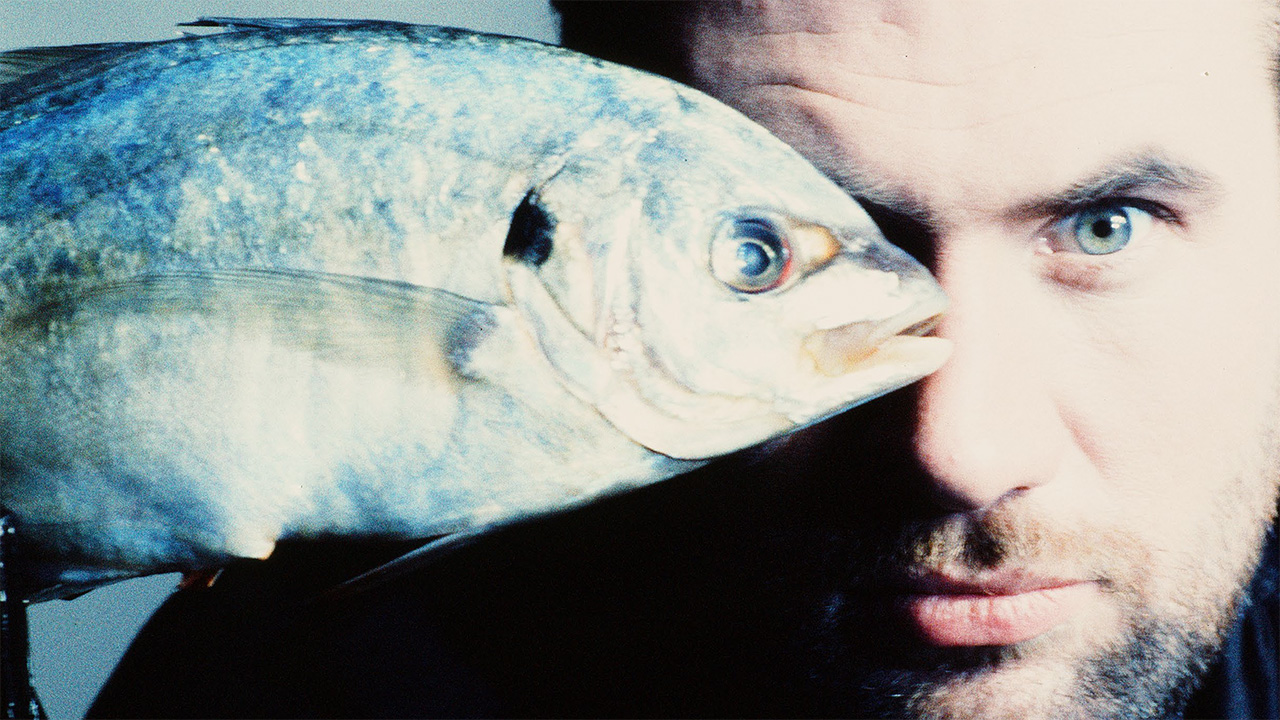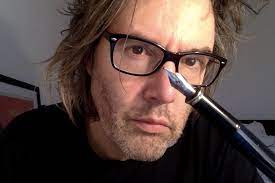The 90s marked a new era for Fish. Four weeks into the new decade, the former Marillion frontman released his solo debut, Vigil In A Wilderness Of Mirrors. Previewed by the singles State Of Mind and Big Wedge, it was a bold announcement of his future intentions. The singer-songwriter looks back on the creation of the Top 5 album that paved the way to him becoming a fully independent artist.
Every new beginning follows an end. Some more fractious than others. For the briefest of moments, before the crash that broke the band apart, Vigil In A Wilderness Of Mirrors might have been a Marillion album – or the idea of one at least. “We were a band playing and selling out fucking Wembley and still rehearsing in a garage in Aylesbury – and not a nice garage, either,” Fish says.
“I hated when it was like, ‘Well, let’s meet in Pete’s garage.’ It’s 1988 and we’re trying to write in this bog-standard space. That made me realise that eventually I’d have to invest in a writing and recording space. I thought that before I’d even thought about going solo.”
He’s in that same space now – a studio and home that he’s soon to give up, moving his life to the Outer Hebrides. But for now, he’s recalling a summer afternoon in Aylesbury when he lived in Gerrards Cross, an affluent town around 25 miles south of Marillion’s base.
“I took the opening lines of Vigil to the garage in Aylesbury, and they were all putting music together. When I went up there I wasn’t in a good frame of mind. I remember it was a really hot day and the garage door was open, and I said, ‘I’ve got an idea’, and started: ‘Listen to me, just hear me out, if I could have your attention / Just quieten down for a voice in the crowd / I get so confused I don’t understand...’
“And they went, ‘Nah.’ They didn’t like it. I said, ‘Play me what you’ve got.’ And it was the usual: this aimless ‘ba-da-da-da-da,’ you know? This fucking sound, it’s just rubbish. So that’ll tell you something about where we both were then.
“I had loads of lyrics kicking around then, even Credo [which appeared on his second album, Internal Exile]. I’d written parts of Big Wedge when we’d toured America – ‘I found a new religion yesterday, I’d just cleared immigration JFK /A priest got in a Cadillac, the shoeshine boy sang gospel’ – and Vigil had that Jim Morrison vibe, those big open roads, high skies.
“Then there was the story of The Company; this is all quite complicated. The band was split then, me on one side and the other four on the other side. I wanted our manager John Arnison gone, and he had the rest of the band on his side, so there were all these power struggles going on. They were having a go at my lyrics, I was having a go at their music; a horrible place to be. And it was right at the time when Pink Floyd were playing London and Bob Ezrin had come across for the shows – he’d done the The Division Bell, he’d done everything.
“I was called into the headmaster’s office because Ezrin was tagged to do the Marillion album. I was sent to Maida Vale to David Gilmour’s house that Ezrin was borrowing, to basically be run over the coals for my lyrics. Seriously. I went in, and he said, ‘Can I see your book, your little black book with the poems in?’”
It was like we were in different room… Mark just wasn’t getting where I was coming from
Ezrin, sitting at a grand piano in the biggest living room that Fish had ever seen, took the black book out of his hands and started to thumb through the pages. “And it felt like an age,” says Fish. “He’s worked with Alice Cooper, one of the great lyricists; he did The Wall, one of my favourite-ever Floyd albums. He says: ‘I’ve heard you’ve got a lot of problems and you’re not really coming up with anything.’
“Then he looks up at me and goes, ‘You’ve got some good stuff in here!’ He asks me if I’m a drinking man, says he’s heard I am, and this was around the time when there was a lot of shit going on. He asked me if I knew Leonard Cohen’s song Bird On The Wire, and if I, in a similar vein, could go away and write a drinking song. And that was where The Company came from; that was my exam and then I wrote it. He never saw The Company. I don’t know whether he’s even ever heard it.”
One person who did, though, was Mark Kelly. Fish invited him to his home in Gerrards Cross, and on an old stand-up piano that once belonged to his Aunt Mary, he sat and patiently tried to explain the song in his head to Mark. But it’s not easy to explain your vision when you’re not a musician.
“We were there for about an hour and a half,” says Fish, “and it was like we were in different fucking rooms. I just couldn’t explain it to him, he just wasn’t getting where I was coming from. This was a time when I didn’t feel Mark was really contributing to the band; he had a lot of issues in his own life and stuff, and I felt it was the case that we needed new blood.
“I felt in 1988 that we were stuck. Ian Mosley and Pete Trewavas were brilliant, but I felt that if Steve Rothery had another foil to play against, it would really bring him out as a player again. I felt on Clutching At Straws that he’d got lazy. Just repeating the same stuff – even [producer] Chris Kimsey called him out on it.
“I wanted to bring in Mickey [Simmonds, Mike Oldfield’s then keyboard player] – great with melodies, great character. I knew if we could shift Arnison then it would clear the way to getting rid of Mark, but it was all becoming political and fucking shitty by then. The band was not the place that you wanted to be anymore. That was why I gravitated towards Mickey. Plus, I suddenly had a friend again.
We should have taken a break from each other – it should have been a case of, ‘Let’s go away to do a solo album’
“I think if we’d had different management at the time, it would have been a whole different game. Our biggest problem was that management were making a fortune off the touring. That was why we were on the road all the time. It was tearing me apart and I was struggling with my voice, and I was unhappy. I mean, we should have taken a break from each other and it should have been a case of, ‘Let’s go away to do a solo album.’ Which I suppose is what I did.”
Vigil In A Wilderness Of Mirrors may have come from a dark place, but it glimmers with light, not least this final celebratory deluxe edition that takes Fish’s career back to the beginning as he reaches its end. The original is very nearly flawless, as are the extra discs of live material, including some BBC recordings and two rare bootleg albums – Pigpen’s Birthday from the Hammersmith Odeon in 1990 and For Whom The Bells Toll!, a New Year’s Eve show from the Edinburgh Playhouse in 1991. All vibrant reminders of the potency of the live band at the time.
“They were the bootlegs that saved my ass in 1993,” says Fish. “When Polydor dropped me after the Songs From The Mirror album, we had nothing. I was still paying off the debts from the studio – this studio – and I had to find a way to finance that.
I had these live recordings, so we went to EMI, and they were really good about it. I said, ‘Am I allowed to do this, release these?’ They went, ‘Yeah, you can.’ And those bootlegs basically enabled me to get the Suits album together and that got the whole Dick Brothers thing going; the first incarnation of my own label and, ultimately, my independence.”
Famously, EMI asked Fish to delay his album so that Marillion might get Seasons End into shops first, which he graciously did, in return of the promise of a big push when Vigil In A Wilderness Of Mirrors landed in stores. It had the desired effect: a brace of Top 40 singles and a Top 5 album.
“Plus I was dealing one-on-one with someone [Mickey], and I could do what the fuck I wanted without having to come through a committee, which was very freeing. After I’d extricated myself from the train wreck that was Marillion, I had this intense period of writing through to the spring of 1989.
I took a Marillion-sized production out… the truck was sitting outside the venue-still half full of gear
“The album was done by August, and then I put the live band together as we were asked to play our first gig, which was a charity event for the Lockerbie disaster. I was living up here then and I remember the disaster so clearly, and that ended up being my first solo show, which was crazy.
“Chris Kimsey helped me put the band together. He was in the frame to do the Vigil album, and he ended up going away to do the Stones, because he didn’t think I’d have it ready in time. He still says it’s one of his biggest regrets, not doing Vigil.
“While I was waiting for the window to release my album, I did that first tour, the Highlands And The Islands tour – which brings things back full circle again; I must have always had my eyes set on a northern star – and we went up and played places like Skye. It was great to get out there and play new songs and do my own thing.
“Financially it wasn’t the best, as I didn’t really know what I was doing. I took a Marillion-sized production out with me and there were nights where the truck was sitting outside the venue and it was still half-full of gear. But it was great, because it was a really angry time, there was still lots of litigation going between me and the guys – so far from where we were when we started out as a band. It was a much-needed release.”





